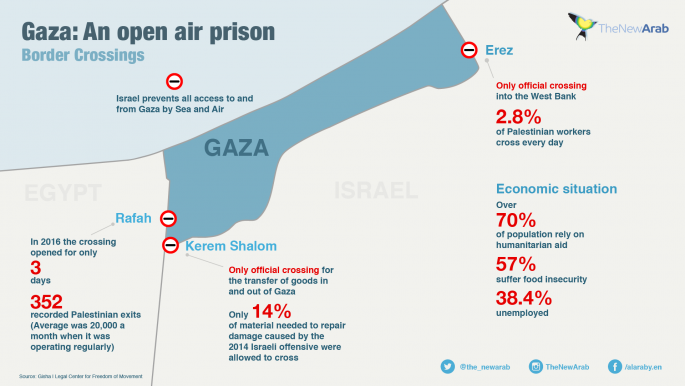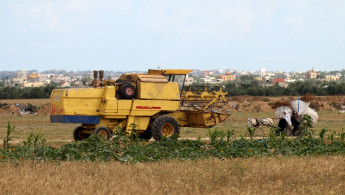International protection for Palestinians sought as Israel pounds Gaza
The Security Council session was attended by all member states, but Palestine's UN envoy, Riad Mansour, accused the US, a close ally and sponsor of Israel, of obstructing the efforts.
"The obstruction continued even after the meeting was held," Mansour told reporters after the three-hour session late on Friday, but said the discussion was nevertheless "successful".
International experts made interventions at the meeting to discuss possible scenarios to ensure protection for Palestinians living in the territories Israel occupied in the six-day war in 1967.
The briefings included one by Dr Ardi Imseis, who has served in senior policy and legal capacities with UNRWA. He presented a legal perspective on the protections and rights accorded to civilians in armed conflict.
"There are several potential ways [to ensure] protection for civilians living in conditions of armed conflict," Imseis told The New Arab.
The Fourth Geneva convention, he added, compels UN Security Council members to work actively to ensure it is adhered to and upheld.
Palestinians, according to Imseis, are entitled under international law to physical protection through the deployment of international forces, for example; legal protection; general protection; and protection through the media.
Although it is difficult to see international forces deploying in the occupied Palestinian territories, Imseis said, this would not be impossible, he insisted, citing the example of a small detail of UN observers working in Jerusalem.
The document presented to the council by Palestine in preparation for the meeting stated: "For nearly 50 years, since Israel occupied the West Bank, including east Jerusalem, and the Gaza Strip in 1967, the Palestinian civilian population has endured systematic human rights violations, and even war crimes, by the occupying power."
It further stated "the international community, foremost the Security Council, continues to fail to hold Israel accountable and to compel a halt to its violations and compliance with its legal obligations".
 |
Technically the public discussion is not considered to be a formal Security Council meeting |  |
The Arria-Formula
 |
| Palestine's UN envoy Riad Mansour [Getty] |
Israel did not attend, and earlier urged sympathetic member states to send only low-level representatives.
International protection and settlement building are the two issues the Palestinians have pushed the Security Council to address this year, with little success.
They have spoken of presenting a formal resolution against settlement activity, but have yet to do so.
The administration of US President Barack Obama has also blocked resolutions against Israel at the council.
"Israel's illegal policies and practices in the occupied Palestinian territories constitute not only grave violations of this obligation, but reflect a total abdication of its responsibilities," read a concept note prepared by Palestinian officials. "Rather than ensuring the safety and well-being of the Palestinian civilian population, the occupying power is the direct and constant source of their suffering and hardship."
They cited three Israeli military operations in Gaza, in the summer of 2014, the autumn of 2012 and the winter of 2008-2009.
The concept paper charged Israel with "deliberate and indiscriminate attacks on civilian areas" in Gaza.
 |
Israel has deprived Palestinians of their human rights by conducting violent military raids, extra-judicial executions, widespread arrests, detention and torture |  |
In the West Bank, the concept note stated, Israel had deprived Palestinians of their human rights by conducting violent military raids, extra-judicial executions, widespread arrests, detention and torture as well as home demolitions and forced displacement of Palestinian people.
It has allowed for "rising Israeli settler violence and terror against Palestinian civilians", the concept note said.
In addition, it added, there remain "draconian movement restrictions violating rights to education, healthcare, livelihood, movement and worship". The concept note made no mention of Palestinian attacks against Israelis.
The diplomatic note pointed out that the Security Council had in the past issued resolutions that called for international protection for Palestinians, including in 1987 and 1994.
"All of this has been to no avail, as the Security Council has remained paralysed, allowing Israel to continue its violations with impunity and with grave consequence for the civilian population," the concept note said.
 |
On Saturday, Israel bombed the Gaza Strip for a fourth day in a row, portending a new round of violence |  |
Fourth day of Israeli attacks
On Saturday, Israel bombed the Gaza Strip for a fourth day in a row, in what many hope does not herald a new round of prolonged violence.
No casualties have yet been reported from Saturday's airstrikes.
 |
| Click to enlarge |
The Israeli strikes damaged crops, homes and buildings in the area.
The Israeli army claimed Israeli aircraft hit two Hamas targets in Gaza early on Saturday in response to rocket fire blamed on Hamas.
However, there had been no immediate claim of responsibility for the rocket launch, and most such fire since 2014 has been carried out by fringe Islamist groups.
"Earlier today [Saturday]... a rocket was fired from the Gaza Strip at southern Israel," the army said in a statement.
"In response... aircraft targeted two Hamas infrastructures in the southern Gaza Strip."
 |
It was the fourth day of the worst cross-border violence since the 50-day war between Israel and Hamas which left 2,251 Palestinians and 73 Israelis dead in 2014 |  |
Hamas security sources told AFP the raid hit two brickworks in the southern city of Khan Younis, causing damage but no casualties.
Other witnesses, however, said two missiles hit a base belonging to Hamas's military wing, east of the city, causing significant damage.
It was the fourth day of the worst cross-border violence since the 50-day war between Israel and Hamas which left 2,251 Palestinians and 73 Israelis dead in 2014.
Mortar fire by Palestinian fighters and Israeli airstrikes and shelling have raised concerns for the future of an informal truce that has held since that conflict ended.
An Israeli tank round killed a Palestinian woman when it hit her home east of Khan Younis on Thursday.
Since Wednesday, Hamas and other resistance groups have shot at least 12 mortar rounds at Israeli forces searching along the border, and short distances inside Gaza, for tunnels leading into Israel.
Such tunnels were among the most feared weapons of Hamas fighters during the 2014 conflict. One was reportedly uncovered by the army on Thursday.
The Israeli military said it had "no interest whatsoever" in a military escalation, but would continue to act against Hamas as "it continues to breach Israeli sovereignty and build tunnels".
Hamas' Gaza leader, Ismail Haniyeh, said on Friday that the group was "not calling for a new war", but would not accept Israeli incursions into Palestinian territory.
A former head of Israel's Shin Bet internal security agency, Yaakov Perry, said that Hamas was fearful of losing the tunnel network, which was one of its proudest military achievements.
Hamas "is using mortar fire to communicate that fear to Israel", he said.
Perry, who is now a member of parliament for the centrist opposition Yesh Atid party, urged the government to avoid adopting a purely military response and to take steps to improve the lives of Gaza's residents.
"It would be good if, in addition to the determined operational activities against the tunnels, Israel would take measures to improve the economic situation and provide options that would show Gazans the possibility of an easier and better future," he said.
Gaza remains under a crippling blockade maintained by Israel and the regime of Abdel-Fattah al-Sisi in Egypt, a close ally of Tel Aviv.Reconstruction of the thousands of homes damaged by Israel's assault on the Strip in 2014 has stalled because of Israeli restrictions on the entry of building materials and the failure of donor countries to honour their pledges, forcing thousands of Gazans to live in makeshift shelters.
Agencies contributed to this report.



